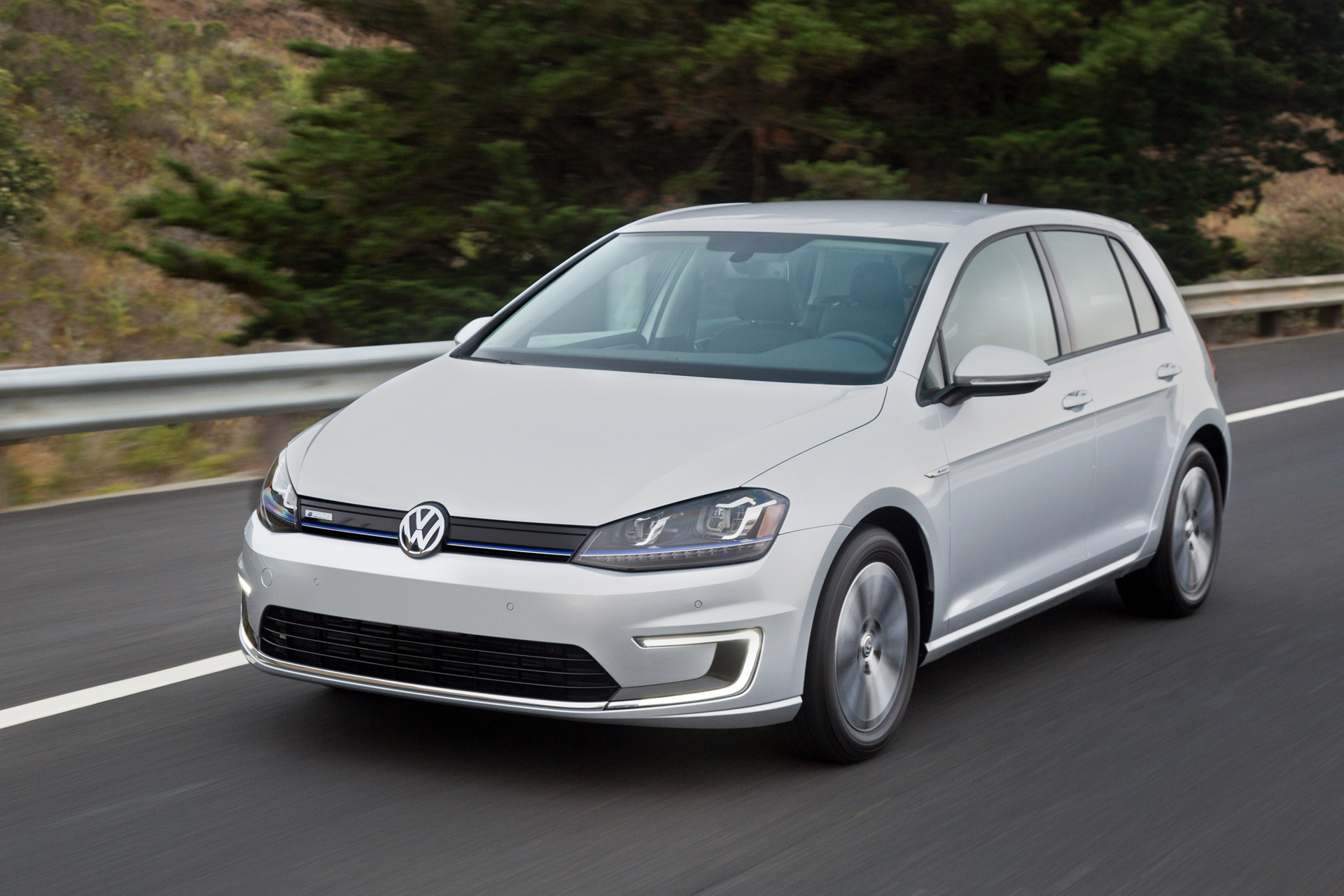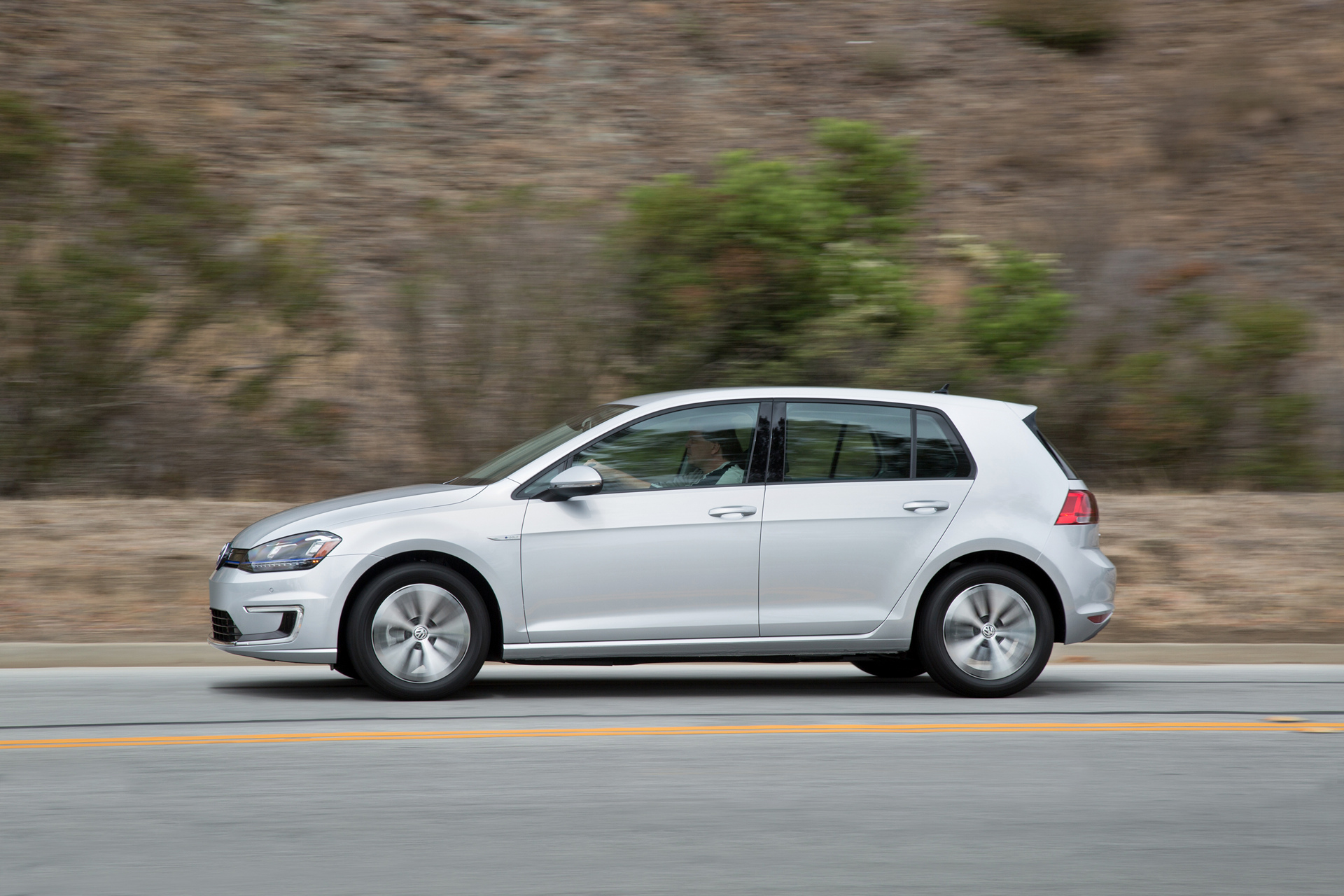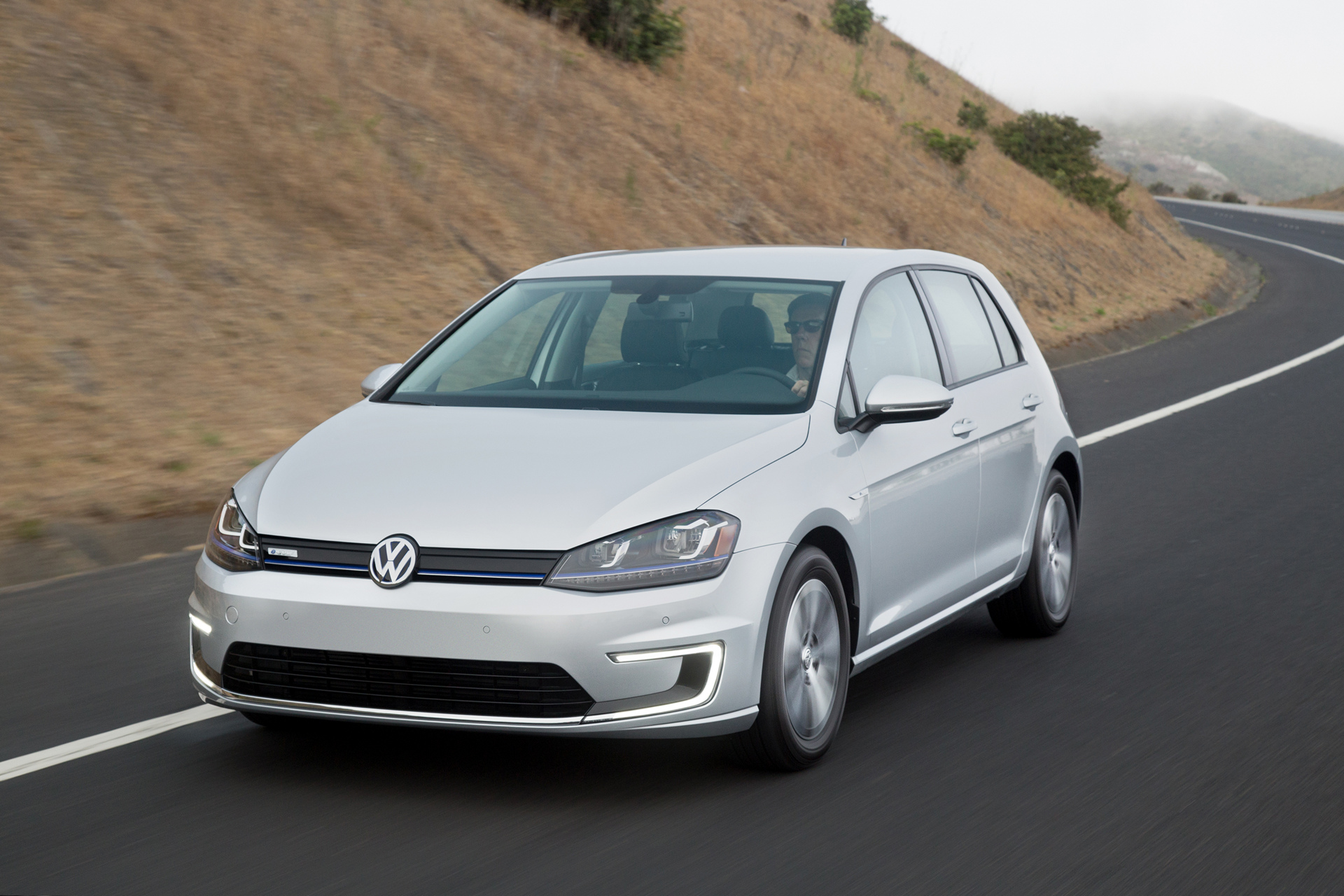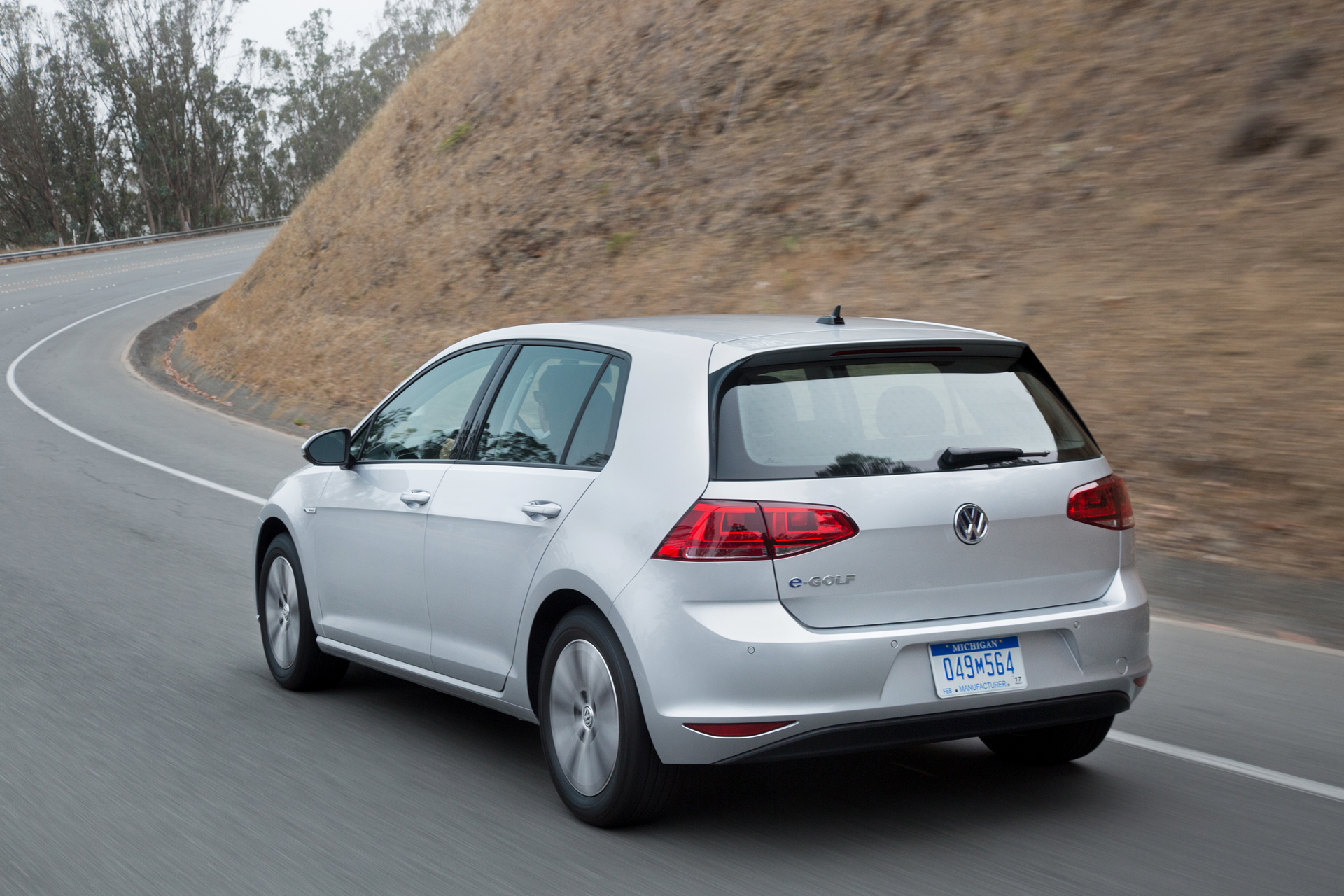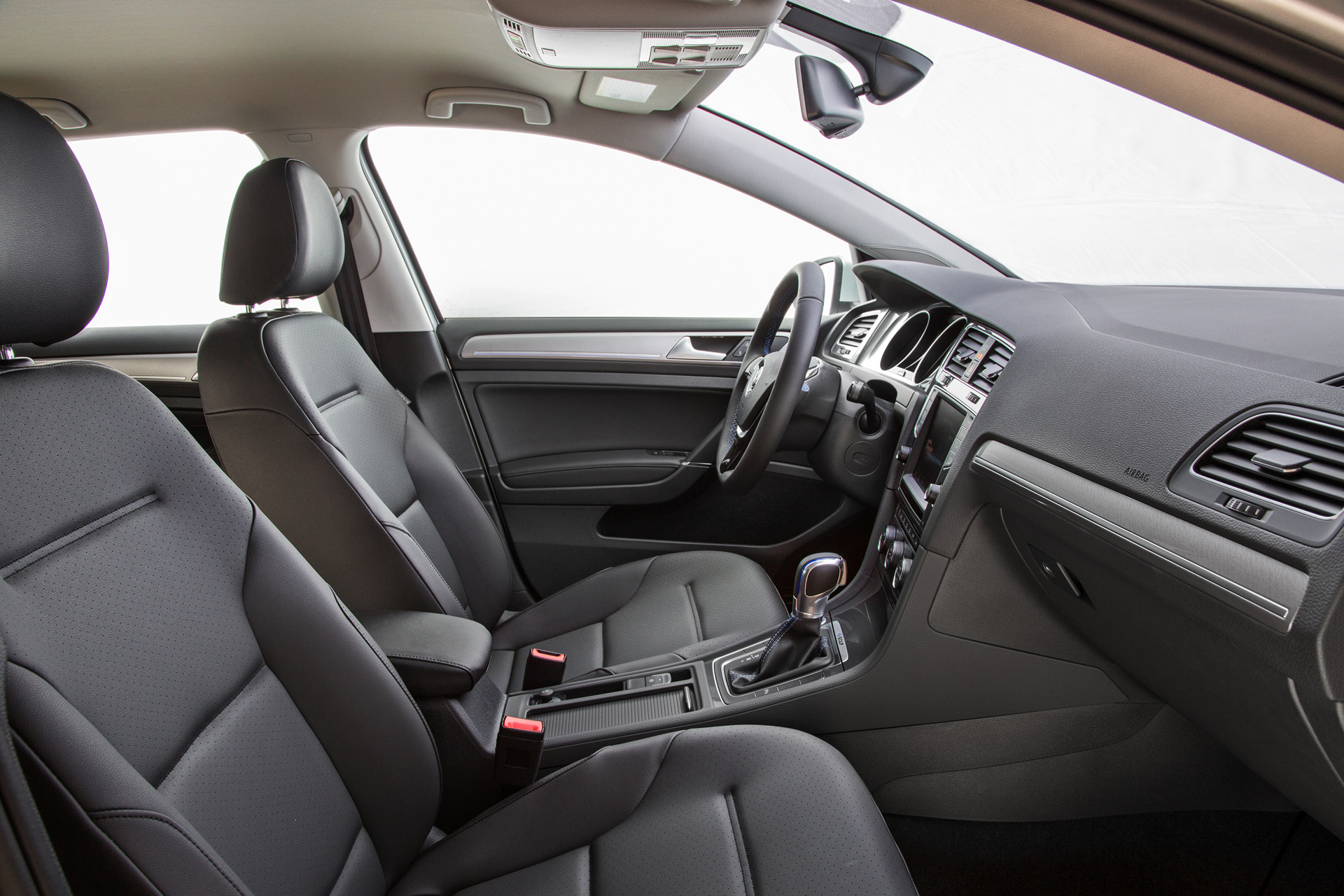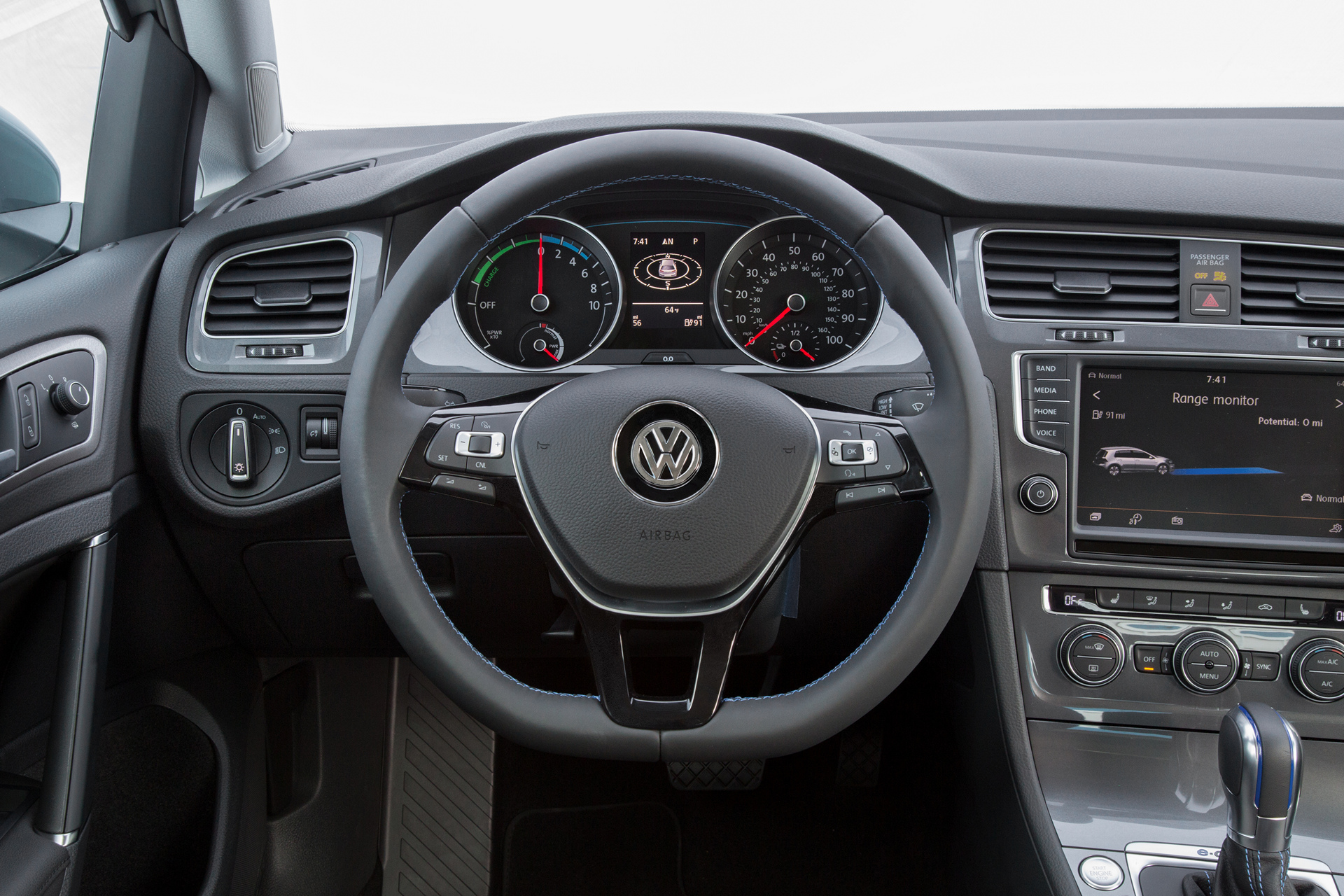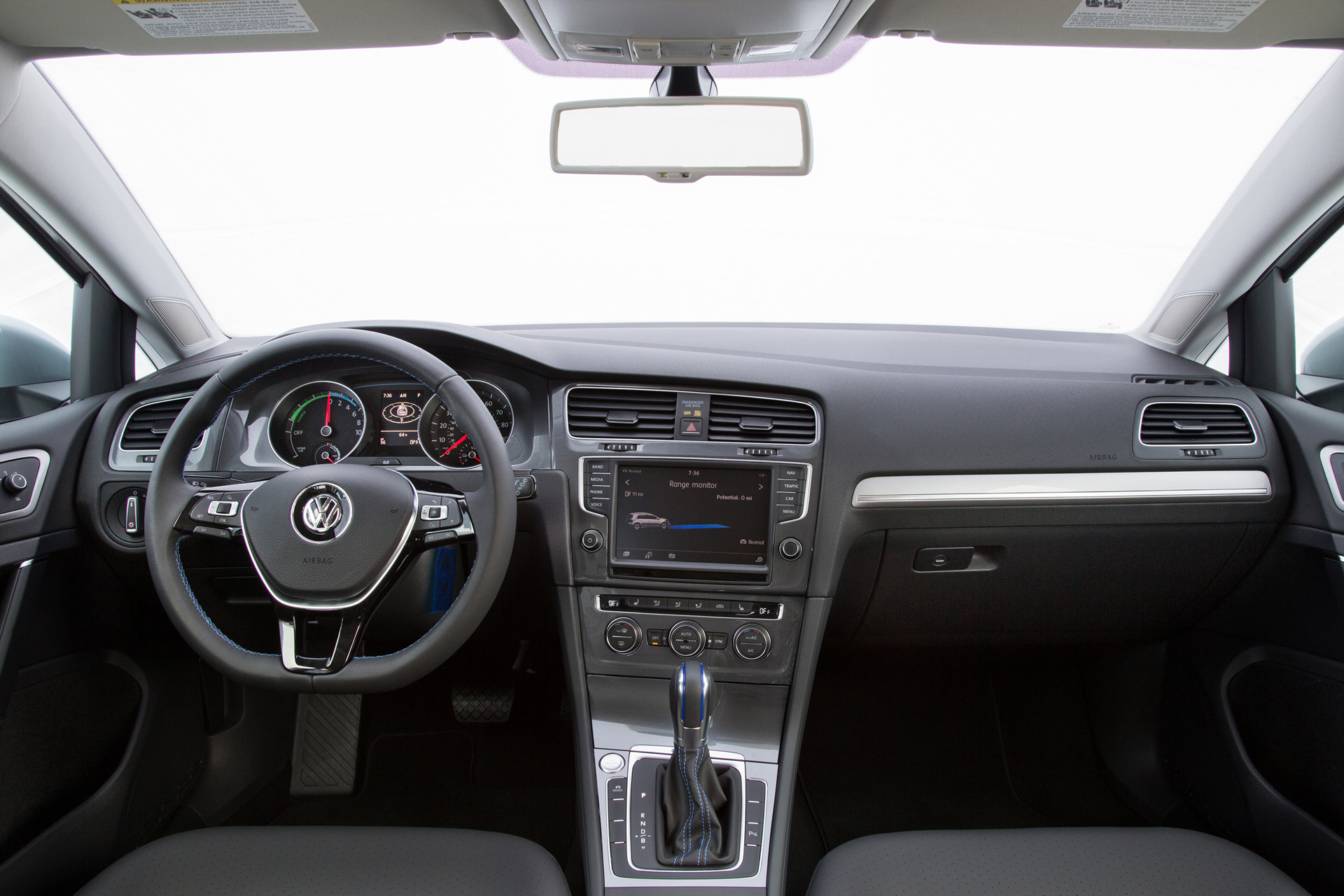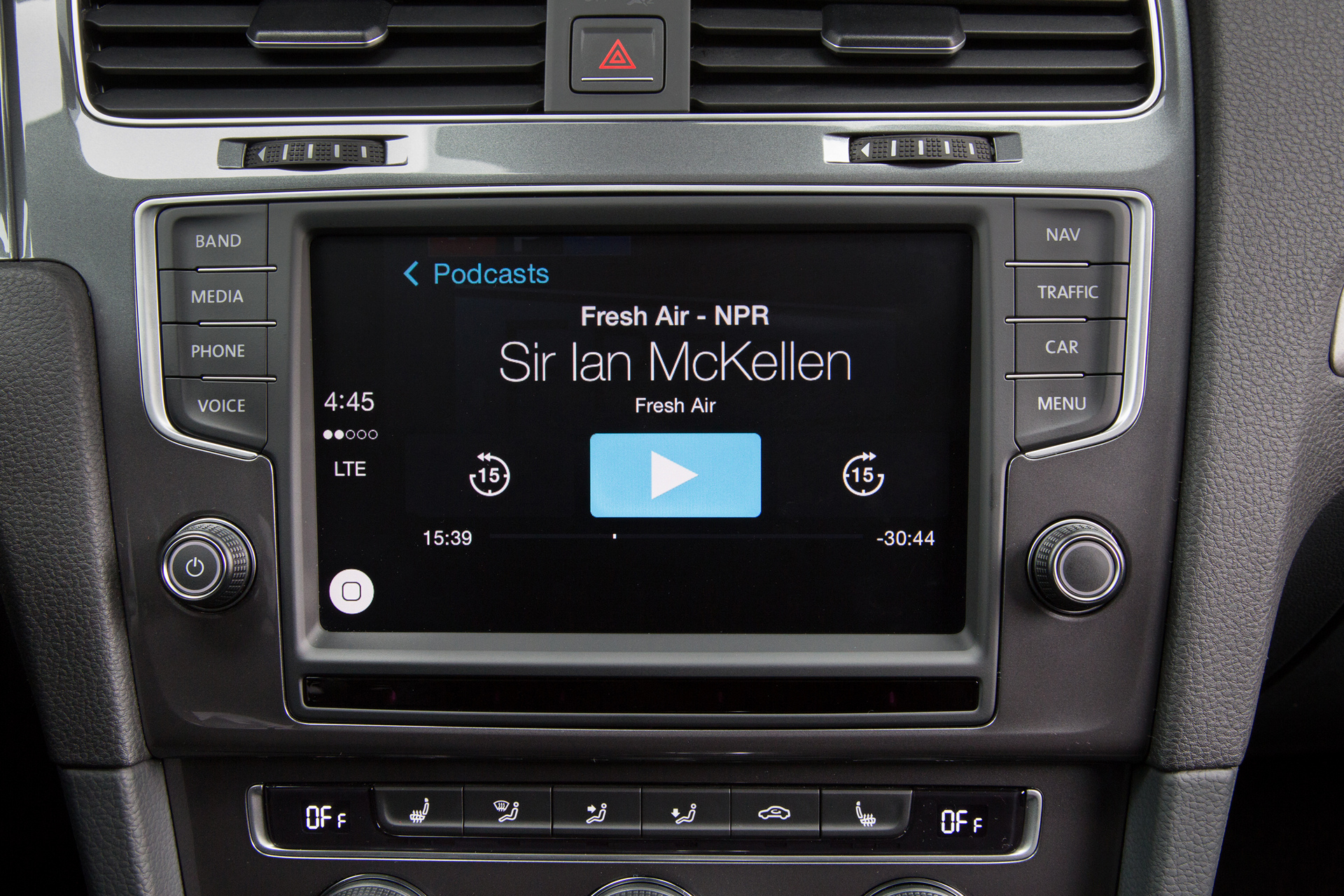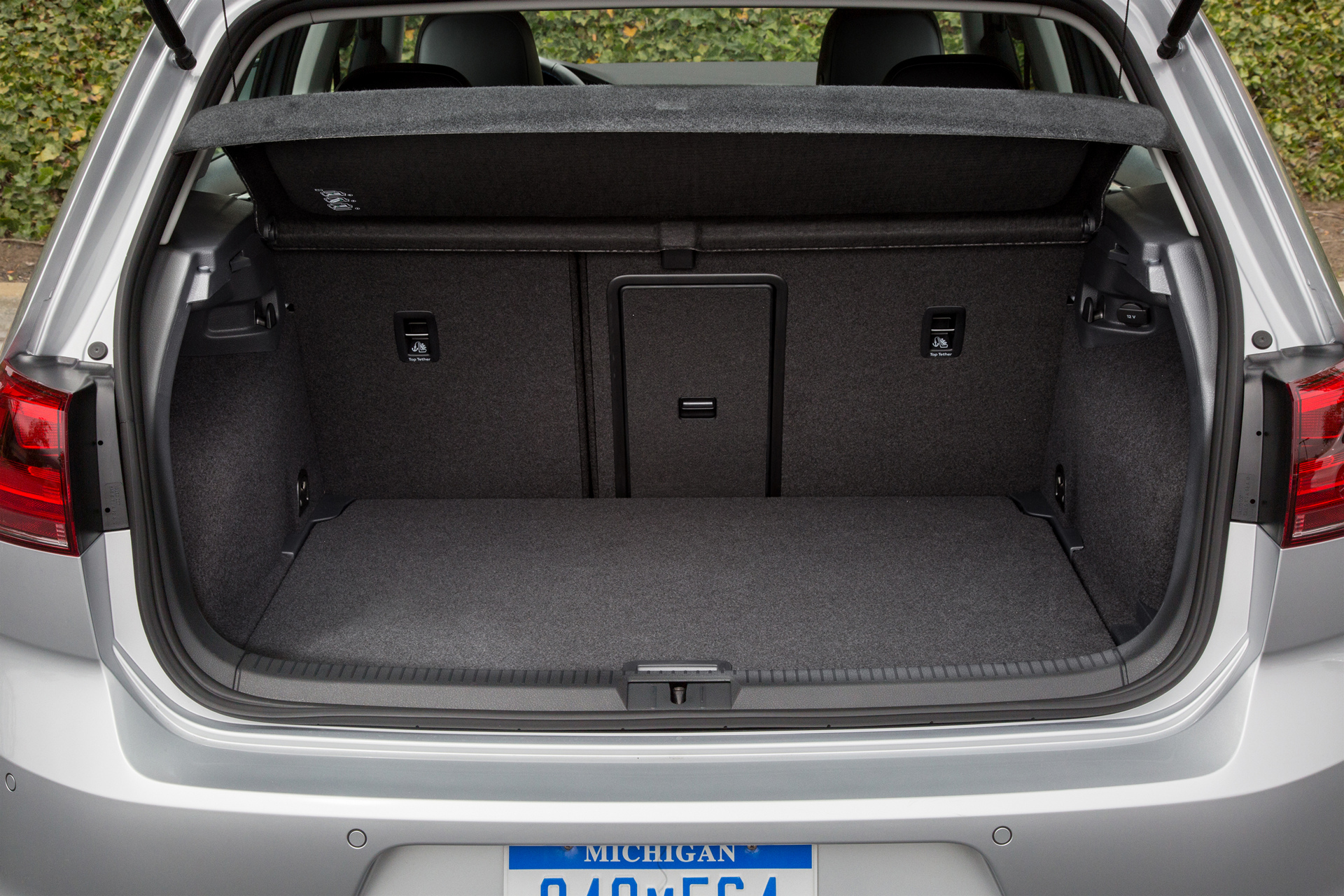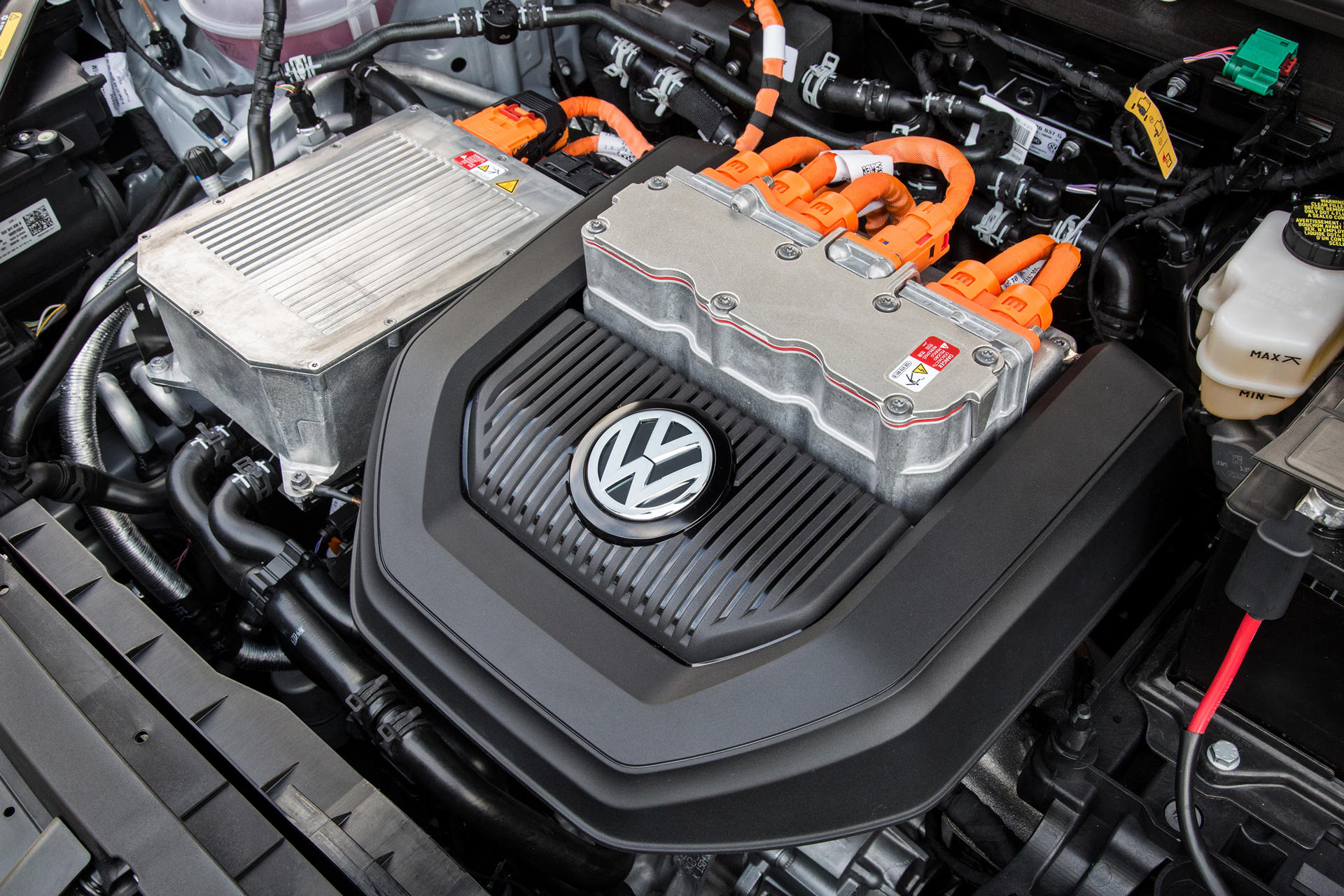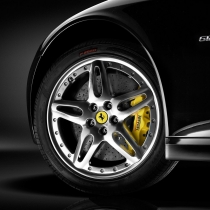The e-Golf is Volkswagen’s first fully electric vehicle for the U.S. market and joined the burgeoning Golf family of versatile, sporty hatchbacks for model year 2015 at participating dealers in select states. The e-Golf brings all the benefits of an electric vehicle to the Golf’s “fun-to-drive, yet practical” formula, forever ending the idea that compact EVs must be bland and focused only on efficiency.
The 2016 e-Golf SE model lowers the cost of entry to e-mobility with a starting price of $28,995, as well as a highly competitive lease price. A 3.6 kW onboard charger is standard, but a DC Fast Charging Package ($1,675) adds the 7.2 kW onboard charger with DC Fast Charging.
The infotainment system provides a comprehensive suite of connectivity features. Volkswagen Group of America is one of the first in the industry to support all three available connected car systems: Apple CarPlay®, Android Auto™ and MirrorLink®. The MIB II system offers USB and Volkswagen-Car Net® App-Connect, allowing owners with these systems to access select apps from their smartphones directly through the vehicle’s head unit. Volkswagen Car-Net’s connected vehicle services umbrella also includes connected car services, advanced telematics, and enhanced navigation available by subscription.
Both e-Golf models get MIB II infotainment systems with EV functions integrated into the head units; SE models feature a 6.5-inch touchscreen and SEL Premium models have an 8-inch touchscreen. A Driver Assistance Package, which includes Forward Collision Warning (Front Assist) and Parking Steering Assistant (Park Assist), is available on the SEL Premium model.
Exterior
The e-Golf shares the majority of its exterior design with the rest of the Golf family, which means it has the same sharpened lines and dynamic proportions as the other seventh-generation (A7) models. It is distinguished by some key features, however. The most notable of these is the energy-efficient LED headlights on the SEL Premium model—the very first application of this technology on any Volkswagen vehicle in the United States. These lights offer greater illumination than traditional Bi-Xenon units, yet use less energy doing so. These LED clusters are complemented by C-shaped LED daytime running light strips in the bumper below. Other clues that this is an all-electric Volkswagen are the unique badges and blue accents, as well as the obvious lack of any tailpipes at the rear.
Not all of the changes are purely aesthetic, as the e-Golf exterior has some unique functional elements. Great attention has been paid to help maximize the car’s aerodynamic efficiency. The most obvious evidence is the bespoke 16-inch aluminum-alloy wheels which are flushed tightly within the wheelarches, helping ensure airflow is smooth and efficient along the sides of the vehicle. These wheels are wrapped in low rolling resistance, 205-section tires. It doesn’t end with the wheels, however, as the radiator shutter and grille, underbody paneling, rear spoiler and C-pillar air vanes all play a role in helping the e-Golf cut through the air as efficiently as possible. The result of this is an impressive coefficient of drag of just 0.27.
Interior
As with the exterior, the e-Golf features an interior that incorporates common elements found in the rest of the 2017 Golf line as well as several unique features. Despite the large battery pack lying underneath, the e-Golf cabin offers exactly the same interior volume as other Golf hatchback models, at an impressive 93.5 cubic feet. It retains the highly versatile Golf cargo area, with 22.8 cubic feet of space behind the rear seats and 52.7 cubic feet with the seats folded. Similarly, it features the same use of upscale materials and premium build quality as other Golf models, as well as the updated ergonomics and driver-centric layout.
Great attention has been paid to helping perfect the e-Golf noise levels and acoustics from both inside and out. Without the vibration and noise from a combustion engine, new sources of sound can become more noticeable inside the cabin such as noise from the wind and the tires. In addition, barely perceptible electric drivetrain noises are joined by the sounds of the electrically powered auxiliary components.
To counter this new acoustic profile, Volkswagen has fitted the e-Golf with a low-speed sound system to help alert pedestrians to the vehicle, and has fitted the interior with highly sound-absorbent, lightweight materials to create a cabin space quieter than many luxury vehicles. Further, the electric powerplant’s subframe was changed to a pendulum mount design, which, along with a low-noise motor housing unit, helps to enhance the calm acoustics of the e-Golf, despite the motor’s high torque buildup under acceleration.
Despite the similarities to the standard Golf model, the e-Golf offers an interior feature list that is entirely its own, including aesthetic details like blue accent elements throughout the cabin and, with the black interior, decorative seams on the steering wheel and shifter. Perhaps more notably though, the instrument cluster has been redesigned for the electric vehicle’s informational needs, with the traditional tachometer being replaced with a power display that indicates if the motor is ready, if the battery is being recharged (via regenerative braking), or if power is being drawn off—as well as an indicator of available output.
To the right of the power display is a conventional speedometer, although its lower section now shows an indicator of the battery’s current state of charge. Between these two gauges lies a color information display that presents critical data such as the current drive options selected, the estimated driving range, and the remaining estimated charging time and type of charge connection. Since the electric motor doesn’t offer the same auditory and physical signs as a combustion engine when it’s running, a “READY” message appears after the motor has been started.
The e-Golf offers a high level of standard and available equipment, including: Keyless access with push-button start; heatable front seats; a leather-wrapped multifunction steering wheel; V-Tex leatherette seating surfaces; a rearview camera; Forward Collision Warning and Autonomous Emergency Braking (Front Assist); Park Distance Control (Park Pilot); and Parking Steering Assistant (Park Assist).
The infotainment system uses a capacitive touch sensor, enabling gesture controls like swiping and even pinch zooming, but features more responsive voice control and navigation functionality. The Discover Pro system on the SEL trim also features the latest NVIDIA Tegra superchip that offers industry-leading graphics and speed. Additionally, EV- specific features such as driving data, charging timers, and remote climate settings can now be accessed through the head unit.
The infotainment system offers one of the most comprehensive suites of connected vehicle services and features available in the automotive industry today. Features available through the Car-Net are divided into three key areas, “App-Connect,” “Security & Service,” and “Guide & Inform.”
App-Connect. The Composition Media unit is available on the entry-level SE model. Featuring an 800×480 capacitive color touch display with proximity sensor, with a 6.5-inch screen, standard features include AUX-in, SD card slots, and a USB multimedia interface with Apple iPhone® and iPod® compatibility, reverse camera display, and Bluetooth® technology with the ability to send and receive SMS text messages with compatible phones, sync two phones simultaneously, App-Connect smartphone integration, electric vehicle functions, two SD card slots, and a JPEG viewer, SiriusXM® Satellite Radio, HD Radio and support for lossless audio file format (Free Lossless Audio Codec FLAC).
The e-Golf SEL Premium model receives the Discover Pro unit, which adds an 8.0-inch color capacitive touch display, one-shot voice destination entry, one-shot Point-Of-Interest (POI) entry, 3D SSD navigation, predicts possible destinations based on often used routes, and Destination Entry with Quick Search and Auto-complete, and Car-Net Guide & Inform. Other features include Jukebox music storage with approximately 10GB of available storage, wireless connectivity, and enhanced electric vehicle functions such as range check and range view in the map, DVD drive, and a simplified route editing features for the navigation which allows the user to drag and drop waypoints directly on the display.
Security & Service. With the Car-Net Security & Service suite, owners can access their VW remotely through vw.com/carnet as well as a smartphone app and an in-car Car-Net button console, providing access to the features available from virtually anywhere your mobile device is connected to wireless internet.
Available security related features include Automatic Crash Notification, which can automatically notify an operator who can contact first responders in the event of an collision; Manual Emergency Call, a feature that allows for quick access to customer specialists at the touch of a button; Roadside Assistance, for added peace-of-mind in the event of trouble on the road; and Stolen Vehicle Location Assistance, which uses VW Car-Net Security & Service to assist law enforcement with locating your vehicle in the event that it is stolen.
In addition, Volkswagen Car-Net Security & Service offers layers of convenience, such as remote vehicle access, remote door lock and unlock, remote honk and flash (of lights), last parked location information, and remote status check (doors and windows).
The Car-Net Security & Service also offers Family Guardian, a suite of features that help families. Features including speed alert, which can notify the owner of the vehicle when the preset maximum speed limit is exceeded; and boundary alert, which can alert you if the vehicle has traveled outside of a pre-set virtual boundary.
Diagnostics and maintenance information is also available through VW Car-Net. A Vehicle Health Report allows Volkswagen customers to check to see an overview of vehicle diagnostics. When it’s time for scheduled service, Car-Net Security & Service can not only alert the customer, but also provide a simple way to schedule a dealer visit. It can even identify the closest dealer in case you need a recommendation.
Guide & Inform. Car-Net Guide & Inform offers an enhanced navigation and infotainment experience for Volkswagen buyers. Volkswagen has incorporated technologies that enhance existing navigation offerings while adding an additional level of information that empowers owners.
Satellite navigation is refined with Car-Net Guide & Inform, incorporating several layers of information right onto the screen. MIB II-equipped Volkswagen models with in-vehicle navigation systems feature real-time fuel prices, sports scores, movie information and weather data as part of the three month SiriusXM Travel Link trial. Volkswagen customers also enjoy real-time traffic information and a complimentary four-year SiriusXM Traffic trial.
Customers purchasing new Volkswagen models equipped with Volkswagen Car-Net Security & Service connected vehicle services (not including App-Connect) will receive a no-charge trial for six months after purchase. To extend the benefits of this connectivity system, customers can choose from a number of Volkswagen Car-Net payment options: 1 year, for $199; 2 years for $378; 3 years for $540; or, month-to-month, for $17.99.
Powertrain
The e-Golf is powered by a synchronous permanent-magnet alternating current (AC) motor, dubbed EEM-85, which operates at 12,000 rpm. The compact electric motor sends its power to the front wheels via a single-speed EQ270 transmission; both units were developed in-house and made at the Kassel components plant. In standard drive mode, it’s capable of delivering a 199 lb-ft of torque along with 115 horsepower, all the while not using a single drop of fuel and producing zero tailpipe emissions.
Depending on driving style, vehicle settings, charging behavior, and other factors, the EPA-estimated average “real world” range for the e-Golf is expected to be approximately 83 miles. To help ensure optimal performance in cold weather, a newly developed heat pump system that is fitted in the SEL Premium model uses both ambient air and heat from the drive system components to warm the cabin rather than relying solely on the high-voltage heater, which can help to reduce on-board electrical consumption, especially in winter driving.
Providing power for the e-Golf electric motor is a lithium-ion battery resting in the center tunnel just ahead of the rear axle and below the rear seats. Thanks to the Modular Transverse Matrix (MQB) flexible architecture, Volkswagen was able to place the large battery within the chassis architecture to eliminate any cabin intrusion or reduction in interior space. The battery is composed of 264 individual prismatic cells, which are efficient enough that the battery doesn’t require any active cooling systems. Co-developed with Panasonic, these cells are integrated in 27 modules of either six or twelve cells each, which collectively produce a nominal rating of 323 volts and an overall capacity of 24.2 kWh. The battery has a limited warranty that covers eight years or 100,000 miles (whichever occurs first) against 70 percent capacity.
At the front of the battery pack lies the Battery Management Controller (BMC), which has a range of functions, from regular diagnosis and monitoring to helping regulate temperatures in the battery junction controller (the interface to the motor’s energy supply). To combat extreme temperature conditions, the BMC utilizes intelligent thermal control algorithms to help ensure that temperatures within the battery pack remain within a pre-determined range for optimal performance. When the e-Golf is not in use (or in the event of a collision), battery power is automatically shut off.
The e-Golf power electronics module helps control the flow of high-voltage energy between the battery and motor. Depending on the battery voltage (which runs between 250 and 430 volts), the module converts the battery’s store of direct current (DC) energy into alternating current (AC). This unit interfaces with the traction circuit connection to the battery, the three-phase connection to the electric motor, the plug connection from the DC/DC converter to the 12-volt power circuit, and the connection for the high-voltage power distributor.
The e-Golf SEL Premium has a 7.2 kW onboard charger as standard equipment, enabling the EV’s battery to be recharged in any of three ways. While the standard charging cable can plug into any 110/120-volt electrical socket and charge the battery in roughly 20 hours, a more optimal solution exists in the optional 240-volt wallbox that utilizes the 7.2 kW to charge a battery in less than four hours. The e-Golf SEL Premium comes equipped with a standard Combined Charging System (CCS) which allows the car to use the SAE standard DC fast charging infrastructure (at available stations), which delivers direct power at up to 50 kW, bringing the battery’s state of charge up to 80 percent in approximately 30 minutes. Any of these options provide categorically cheaper ownership costs than fueling a traditional combustion engine.
The e-Golf SE comes equipped with a 3.6 kW onboard charger, but can be upgraded to the 7.2 kW onboard charger with the DC Fast Charging Package ($1,675). If owners stick with the original charger, expect charging time to double.
Innovative driver control
The e-Golf features two technologies that allow the driver to control the vehicle’s energy use: three driving profiles designed to preserve energy (“Normal”, “Eco”, and “Eco+”); and three different levels of regenerative braking (“D1”, “D2”, and “D3”/”B”).
The e-Golf automatically defaults to the “Normal” driving profile, which offers the full horsepower and torque of the electric motor, enabling the e-Golf to reach 60 mph from rest in just over 10 seconds and continue on to an electronically-limited top speed of 87 mph. If greater range is needed, the driver may select from either “Eco” or “Eco+” modes.
In “Eco” mode, maximum power is limited to 94 horsepower and 162 lb-ft, and adjustments are made to the air conditioning system and the response curve of the accelerator pedal. Top speed in “Eco” mode is electronically limited to 72 mph and 0-60 mph performance is approximately 13 seconds.
In “Eco+” mode power output is limited to 74 hp and 129 lb-ft; top speed won’t exceed the electronically limited figure of 56 mph and the accelerator pedal response curve is flattened even further. In addition, the vehicle’s air conditioning is switched off to help maximize efficiency. Regardless of the drive mode selected, however, full accelerator pedal “kick-down” will result in the maximum power and performance of the “Normal” mode.
In addition to the driving modes, the regenerative braking system can also be used to help manage the e-Golf range. There are three driver-selectable levels available: “D1”, “D2”, and “D3”/”B”. By helping to control the amount of energy that can be recuperated from braking, the e-Golf can achieve additional driving range. If the battery is fully charged and the vehicle is in standard “D” mode, no regenerative braking will occur. If you lift off the accelerator pedal or tap the shift lever to the left, the first level of regenerative braking, “D1,” is activated, wherein a small amount of energy is recuperated (and the car is slowed slightly). Levels “D2” and the maximum “D3”/“B” offer increasing levels of energy regeneration.
Chassis
The e-Golf shares the same spry MQB chassis architecture as the rest of the line. The unitary construction chassis has two solid-mounted subframes with bolt-on front fenders, and utilizes new technologies such as the laser clamp welder. This produces “wobble seam” welds in a wave pattern to help maximize strength in a limited space, offering up to four times the strength of a traditional spot weld.
The e-Golf’s stamped steel body and chassis—like its 2017 Golf counterparts—boasts 28-percent of its parts in high-strength, hot-formed steel, as opposed to six percent in the previous generation Golf. This technology—along with the use of newly developed ultra-high-strength steels that weren’t available during the last generation’s development and now comprise nine percent of the new Golf’s bodyshell—allows much of the chassis and body to be constructed from thinner and lighter parts without any loss in strength. Thanks to the use of selective thickness for parts, a single component can be tailor-rolled to have as many as 11 zones of varying thicknesses. The e-Golf SE weighs 3380 pounds, just 357 lb more than a four-door Golf 1.8T automatic model, despite the 701-pound battery.
The e-Golf features a strut-type front suspension with a rear multilink arrangement that has coil springs, telescopic dampers, and an anti-roll bar. The rack-and-pinion steering features electric power assist and features a 13.6 to one ratio that allows for 2.76 turns from lock to lock.
Like other 2017 Golf models, the e-Golf is equipped with the XDS® Cross Differential System—a feature previously only seen on the performance-oriented Golf GTI model. This technology acts somewhat like an electronic substitute for a traditional mechanical limited-slip differential, working by actively monitoring data from each wheel sensor. If the suspension becomes unloaded, the system automatically applies braking to the driven inside wheel as needed to help reduce understeer (the tendency for the front wheels to run wide). This not only helps the e-Golf’s stability, but also contributes to improved handling and cornering performance.
Safety
Like the rest of the Golf line, the e-Golf provides a combination of both passive and active safety systems. It has been engineered to meet or exceed all current crash regulations and features six airbags as standard along with a number of electronic and mechanical driver assistance and safety systems.
The e-Golf also features Volkswagen’s Automatic Post-Collision Braking system. This builds on the premise that a collision is rarely a single, instantaneous action, but rather a series of events that follow the initial impact—the most significant of which can cause additional collisions. The Automatic Post-Collision Braking system addresses this by applying the brakes when a primary collision is detected by the airbag sensors, thus helping to reduce residual kinetic energy and, in turn, the chance of additional damage.
The e-Golf also includes Volkswagen’s Intelligent Crash Response System that shuts off the fuel pump, unlocks the doors, and switches on the hazard lights if the car is involved in certain types of collisions.
Driver Assistance Systems
The SEL Premium is fitted with standard Park Distance Control. This system uses ultrasonic sensors located in the front and rear bumpers to monitor a range of up to five feet in front or behind the vehicle. The system is activated when reverse gear is engaged or below a speed of 9 mph and helps provide guidance when parking or in tight situations. The system has audible and visual warnings when the car starts to approach parked cars or static objects from the front or rear.
The available Driver Assistance package ($395) on the SEL Premium model adds Forward Collision Warning and Autonomous Emergency Braking (Front Assist), as well as the Parking Steering Assistant (Park Assist).
Within physical system limits, Forward Collision Warning helps warn the driver of critical front-end collision situations, both acoustically and visually by a warning symbol in the instrument cluster, and, if necessary, Autonomous Emergency Braking is activated to slow the vehicle if the driver fails to brake. If the brake pedal is applied but the driver brakes too lightly, the brake pressure is increased by the system (Braking Support).
The Parking Steering Assistant automatically steers the car into parallel and perpendicular parking spaces in reverse. After pressing the Park Assist button—once for parallel and twice for perpendicular—the driver only needs to activate the accelerator pedal and brake once a gear is selected, as Park Assist automatically helps steer the vehicle into the parking space.
The driver can override or deactivate the steering assistance at any time by turning the steering wheel, disengaging reverse gear or pressing the button. Below 25 mph, the system scans both the left-hand and right-hand sides of the road, for example in a one-way street, for any parking spaces as it drives past. By activating the turn signal, the driver stipulates which side of the road they wish to park on.
Customer Experience
Volkswagen’s holistic approach to e-mobility is shown with a complete ownership package for the e-Golf.
- Every buyer can take comfort in the knowledge that their purchase had an impact for the better, since Volkswagen has teamed with 3Degrees, a renewable energy and carbon offset services provider. The relationship brings new meaning to the idea of a car with a low carbon footprint. By investing in carbon reduction programs, Volkswagen will help offset the e-Golf’s greenhouse gas (GHG) emissions that result from its production, distribution and from the estimated emissions produced from keeping the vehicle charged through the initial 36,000 miles of the vehicle’s life. Volkswagen of America chose to include carbon reduction efforts in California and in Texas with projects geared towards forestry conservation and landfill gas capture.
- As part of Volkswagen’s efforts to deliver an ultra-low-carbon car, the company is also working with SunPower® to provide qualified U.S. Volkswagen e-Golf customers the opportunity to install a high performance SunPower solar system. Select Volkswagen customers will receive premier access to an energy storage solution from SunPower for a limited time once it becomes commercially available. Combining solar with energy storage will help provide homeowners peace-of-mind and opportunity to access back-up power during a power outage.
- When it comes to charging, Bosch® Automotive Service Solutions serves as a charging station and installation services provider for e-Golf vehicles. Bosch® will provide the optional 240-volt charging unit, the Power Max® charging station, as well as full-service installation for qualified e-Golf drivers. The charging station and installation are offered at highly competitive prices to e-Golf customers.
- Additionally, ChargePoint® will provide authorized e-Golf dealerships with charging stations and e-Golf owners have access to the ChargePoint network of public EV charging stations. As a result, e-Golf drivers have access to more than 18,000 ChargePoint stations around the U.S., in addition to those stations installed at authorized Volkswagen dealerships. e-Golf drivers will be able to access to the ChargePoint mobile app from their compatible device, which will help them navigate to ChargePoint stations, see real-time status updates relating to ChargePoint stations and start charging sessions.
- The e-Golf has its own dedicated Volkswagen Car-Net Security & Service app. This available app allows e-Golf owners to remotely adjust vehicle settings via compatible mobile devices, as well as the Volkswagen Car-Net Security & Service website. Through the app, owners can start (and stop) the car’s climate control system as well as view temperature readings. Similarly, the charging process for the battery can be started, stopped, and set to a time. The e-Manager enables drivers to pre-program up to three departure and charging times. Owners can access a variety of data through the information display on the app, including: miles driven; journey time; estimated electric motor power consumption; estimated power consumption of auxiliary components such as air conditioning and radio; and the use of regenerative braking. Owners can even simply check the status of the car’s door and trunk locks, lights, charging cable or GPS location.
- Finally, Volkswagen’s Roadside Assistance Plan is designed to take the potential stress out of planning around the range limits of an EV. For instance, if the e-Golf runs out of charge within 100 miles of the owner’s home, Volkswagen will arrange for the car to be delivered to a nearby, convenient source for charging, as well as pay any taxi or transportation fees for the owner.
Limited Warranty
The 2017 e-Golf is offered with Volkswagen’s five-year/60,000-mile powertrain limited warranty and three-year/36,000-mile new vehicle limited warranty. The e-Golf also has a battery limited warranty that covers eight years or 100,000 miles against 70 percent capacity. E-Golf owners should see their Volkswagen dealers for more information about these limited warranties.
Model Line-up
SE:
- $28,995 MSRP (plus $820 destination and delivery)
SEL Premium
- $35,595 (plus $820 destination and delivery)


